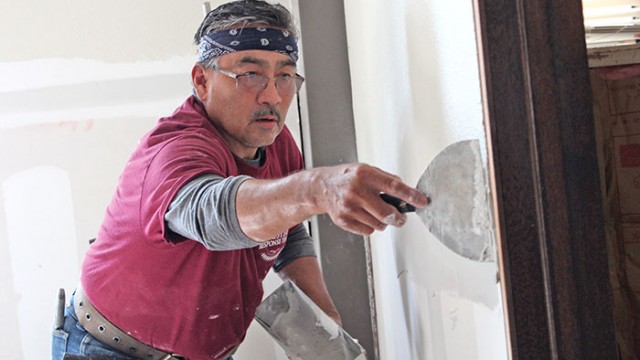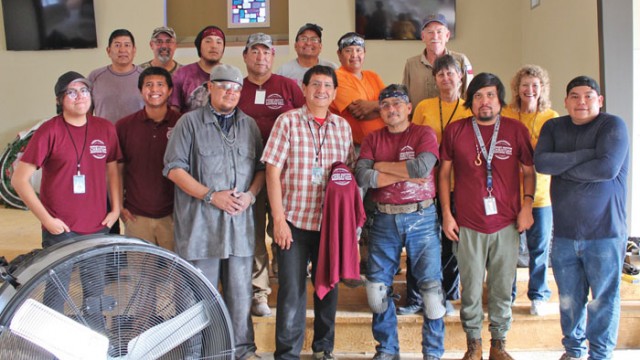
PORT ARTHUR, Texas (BP) — For generations the Navajo have often been on the receiving end of volunteer mission teams. Buddy Evans chaperoned one such trip in 1985. For two weeks his team led Vacation Bible School in the mornings, revival meetings in the evenings and, in between, explored the desert high country of New Mexico — a stark contrast to their home in Port Arthur, Texas.
 Evans found the Navajo culture intriguing and the people’s openness to the Gospel encouraging. Nearly a generation later Evans would again be encouraged when the Navajo Nation’s first disaster relief team arrived at his flood-ravaged home and offered aid in the name of Christ.
Evans found the Navajo culture intriguing and the people’s openness to the Gospel encouraging. Nearly a generation later Evans would again be encouraged when the Navajo Nation’s first disaster relief team arrived at his flood-ravaged home and offered aid in the name of Christ.
“I was just amazed how eager they were to come and help me,” said Evans, his voice faltering momentarily with emotion.
News of Navajo families living in Hurricane Harvey’s devastated regions concerned Navajo Christian leaders including tribal President Russell Begaye, a former North American Mission Board missionary, and Vice President Jonathan Nez. But their inability to respond quickly to needs outside the reservation demonstrated a weakness in Navajo churches — they had always been receiving missionaries, not sending them.
That changed in the wake of the storm.
Church and ministry leadership pooled their experience and resources to recruit, train and deploy the first Navajo Nation Christian Response Team (NNCRT) Oct. 21, just eight weeks after Harvey rolled into southeast Texas.
 Navajo-led church and parachurch ministries within the reservation have for decades provided material support, including building and repairing homes, for the needy in and outside the reservation. But the NNCRT is the first of its kind and draws exclusively from the Navajo Christian community across the reservation to deploy disaster response teams at a moment’s notice.
Navajo-led church and parachurch ministries within the reservation have for decades provided material support, including building and repairing homes, for the needy in and outside the reservation. But the NNCRT is the first of its kind and draws exclusively from the Navajo Christian community across the reservation to deploy disaster response teams at a moment’s notice.
“We are the largest tribal nation in the U.S.,” Nez said during a break from floating drywall at Trinity Church in Port Arthur. “We need to emulate service. The world calls it volunteerism. As believers, we call it service.”
The first team deployed for a nine-day trip, clearing debris that remained in homes after the initial mud out, including Evans’ home. But another assessment determined the ceiling had to come out as well. The NNCRT made quick work of the job, a grateful Evans said.
What initially drew the NNCRT to the region was a Navajo family living in Port Arthur. Providing assistance for their own people was the impetus for the response teams’ development. But once in the region, Mike Liles, Southern Baptists of Texas Convention disaster relief coordinator, facilitated additional work and arranged their stay at First Baptist Church, Groves.
Within a week of returning home from the first mission trip, the NNCRT deployed its second crew to Port Arthur Nov. 5 for a week of hanging drywall in the gutted Trinity Church. A disaster relief crew from Memphis-area Bellevue Baptist Church in Cordova, Tenn., also assisted at the church and the surrounding community, having deployed fresh volunteers every week for months.
Each work day began with a morning devotional, which Nez led Nov. 7. Drawing from 1 Corinthians 12, he reminded the mixed-race work crew that the spiritually effective Body of Christ is made up of all kinds of people. The message could not have been more poignant, said Mike Due, Trinity Church pastor. Due, who is Caucasian, pastors a predominantly Hispanic, bilingual congregation.
“The humbling thing is it’s the grace of God,” Due said as he surveyed the repairs being made to his church building that had taken on 14 inches of water and held it for a week.
The multi-generational Navajo crew caught Liles’ attention. He’s used to seeing disaster relief teams composed of middle-age adults or retirees. But the dozen male team members hanging drywall and doing repairs were in their early-to-mid 20s through middle age.
It was the younger generation — tech savvy and with a heart for their people to know Christ — that got the NNCRT up and running. Once they had the go-ahead from Begaye, Nez and ministry leaders Seth Stevens, 25, Kyle Curley 30, and Adam Dehiya 23, all associated with Western Indian Ministries, created the non-profit organization. They solicited donations and pooled the human and material resources to launch the teams.
Crew members are hopeful the publicity back home about the NNCRT will open more opportunities to share the Gospel. John Emerson, a Navajo who works with Cornerstone Ministries, a home repair and construction outreach, knows it is the biblical “man of peace” who may have an easier time getting a hearing for the Gospel among the Navajo than someone from another culture.
“If I go to them and tell them about the Gospel,” they might be more apt to listen, Emerson said.
The U.S. government’s historical treatment of the Navajo has been, and for some continues to be, a source of tension. Past injustices have left deep scars. That is the context into which Christians — Navajo and non-native American — must speak.
Nez did not dismiss those grievances. But he believes that even in difficult times, God has always had a plan for the Navajo people. And healing can be found among the Navajo, who generally value resilience, and in Christ, who requires forgiveness, he said.
“That’s the story of Christ — moving forward, forgiving,” he said. “That’s more relevant than ever.”















